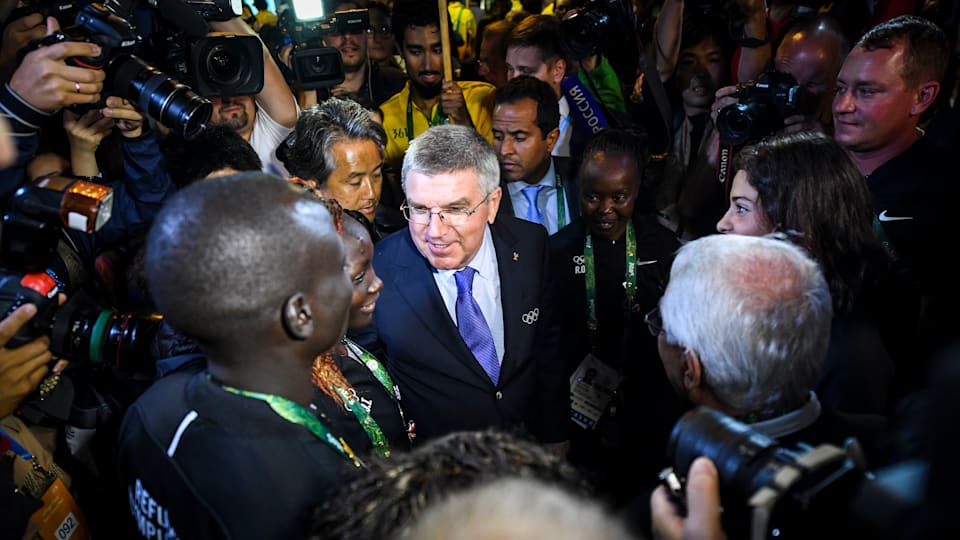IOC and UNHCR collaboration: Leveraging the power of sport for good - for over 25 years
It’s been over 25 years since the International Olympic Committee and United Nations joined forces. Here’s an explainer of the initiatives they have created – and people they have helped, including refugees.

While the year 1994 marked the first time the Winter Olympics were to be held in an opposite year as the Summer Games, it was also the start of the long-lasting relationship between the International Olympic Committee (IOC) and UNHCR, the United Nations Refugee Agency.
Since its inception, the partnership has helped to highlight some of the many positive and remarkable stories of displaced young people’s lives being transformed through sports.
Together with an NGO partner, Terres des hommes, UNHCR and the IOC have developed a toolkit to help deliver high-quality ‘Sport for Protection’ programmes. Since 2014, these efforts have taken root in Jordan, Ethiopia, Colombia, Rwanda, Mexico, and the Democratic Republic of the Congo.
In 2016, the inaugural Refugee Olympic Team took part at Rio 2016, with 10 athletes competing under the Olympic banner. A second such team will compete at the Tokyo 2020 Games in 2021.
In 2017, the IOC launched the Olympic Refuge Foundation to help create safe, accessible, organized ‘Sport for Protection’ projects that serve displaced individuals from vulnerable communities.
“UNHCR has celebrated the power of sport for refugees’ protection and well-being and has been an advocate for our Olympic values,” said IOC President Thomas Bach in January of 2020. “Without UNHCR we could not have created the IOC Refugee Olympic Team.”
The partnership's goal has been to leverage the power of sport and the Olympic Movement to assist and protect forcibly displaced children and youth.
For the last 25 years, the IOC and UNHCR have enjoyed a strong partnership that has seen the implementation of sports projects for refugees in more than 50 countries. Using sport as a tool for protection and promotion of youth development, education, social integration and well-being, these actions have brought hope and healing to refugee populations in many camps and settlements around the world. Sports programmes have also proven to be a catalyst for empowering displaced communities, helping to strengthen and to foster peaceful relationships and co-existence with host communities.
Bach continued: “The commitment of the IOC and the entire Olympic Movement to support refugees is based on our fundamental belief in the power of sport to make the world a better place. UNHCR shares our belief in sport as a force for good in the world. For children and youth uprooted by war or persecution, sport is much more than a leisure activity. It is an opportunity to be included and protected – a chance to heal, develop and grow.”
In addition to the UNHCR’s support for the creation of the IOC Refugee Olympic Team, it is also a trusted partner of the Olympic Refuge Foundation (ORF), which was officially launched by the IOC in September 2017. With the aim of ensuring that one million forcibly displaced young people have access to safe sport by 2024, the ORF works in close collaboration with UNHCR and other partners to create safe, basic, and accessible sports facilities and programmes for young refugees, forcibly displaced young people, and their host communities.
In late 2019, at the first ever Global Refugee Forum, the IOC announced that a Sport Coalition consisting of over 80 partners – from governments to National Olympic Committees, International Sports Federations, clubs, associations and civil society organisations – had expressed its commitment to supporting refugees through sport. This unprecedented global initiative, coordinated by the ORF, has made three important pledges:
- To promote and ensure access for all refugees, without distinction of any kind, to safe and inclusive sporting facilities.
- To increase availability and access to organised sports and sport-based initiatives for refugee and hosting communities, actively considering age, gender, ability and other diversity needs.
- To promote and facilitate equal access to and the participation of refugees in sporting events and competitions at all levels.
In August of 2020, the 2016 Olympian Yiech Pur Biel, a member of the Refugee Olympic Team, was named as a UNHCR Goodwill Ambassador, further strengthening the relationship and movement between the two entities.
“I want to use my own personal story and status as an athlete to help advocate for other refugees and displaced people around the world,” Biel said. “Because sport can bring both opportunity and hope!”
